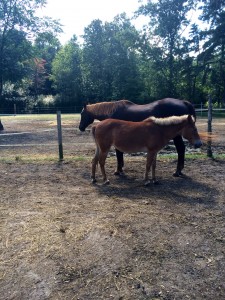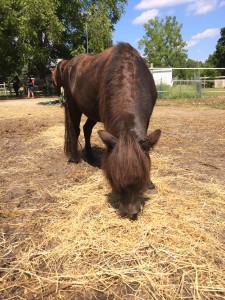On September 6, 2014, Stockton’s 11th annual Day of Service, I went with a group of about twenty girls to South Jersey Horse Rescue. Having seen signs all around the campus for the event, I was eager to sign up to volunteer. When the day finally came, I woke up bright and early and prepared for a hard day of work helping whatever organization I ended up with. As I had already taken a look at the organizations that would be represented at the event, I was especially interested in South Jersey Horse Rescue, not only because I am very close with the woman who puts her heart and soul into the rescue, Ellen Strack, but also because it is imperative to help those gentle animals who suffer so in states of neglect and mistreatment.
After floating down the steps in the Campus Center to receive our t-shirts telling of our participation in the event, eating breakfast, and filling out a short waiver, we made our way to the event room. I quickly found SJHR’s table, and despite not recognizing any of the people sat there, I had a seat and introduced myself. These fresh and friendly faces would become more familiar as the day went on, but in that room we were still unsure of what was in store, and certainly none of us could have imagined just how much we would be doing for the people and horses we met at the rescue.

After arriving at the site, we were greeted by an exasperated and jolly Ellen bearing a checklist to be completed. The friendly sharpie on the orange poster board spelled out tasks ranging from relocating a tent that had sheltered a horse brought to the rescue only a few weeks before whose body was completely emaciated—scoring 1 on the horse body scale—who died there shortly thereafter, to replacing plastic insulators on the electric fence that keeps the horses from wandering away , to shoveling horse manure into empty feed bags to garner donations from local residents who fertilize their gardens with it, to sorting through trash, left from a huge fundraising concert Ellen had hosted, for recyclables and cans. She appeared a bit disheartened at the lack of male muscle-power present, but our group of strong women put all of our hearts into helping Ellen and by two o’clock, all of the tasks she had set out had been completed. Even our bus driver, Ray, helped massively by fixing Ellen’s broken lawn mower just enough to be able to mow the entire property before it broke down again, this time, for good. It was an extremely hot day, but having the horses as well as so many positive, hard-working people around all the time gave us the strength to power through the hours we spent there.
Personally, I feel this is definitely an organization I would help again, after seeing first hand just how much Ellen gives to her horses, and seeing the massive amount of work that goes into keeping the rescue running smoothly and helping as many horses as possible. Despite the lack of glamour in the tasks on our plate, we finished essential jobs that would have taken their few regular volunteers so much time to complete. If such a large group of people went in to help the rescue on a more regular basis, it would be possible to give the horses even better care—all the brushing and riding they could ever ask for—and perhaps even expand the site to be able to facilitate more horses. In addition, this would increase awareness for this organization that should be given unlimited spending to help those gentle and mistreated creatures.

